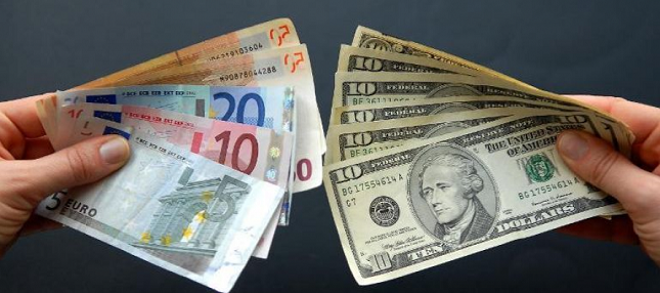Advertisement
Advertisement
The EUR/USD Rebounds back to Resistance but Soft a German Zew Caps the Upside in the Currency Pair
By:
The EUR/USD rebounded on Tuesday moving back toward the breakdown level that is fell through on Monday. The ECB lending survey showed easier lending
The EUR/USD rebounded on Tuesday moving back toward the breakdown level that is fell through on Monday. The ECB lending survey showed easier lending conditions while the German IFO tumbled in April. French business confidence declined while the ECB’s Villeroy told banks to prepare for a recession.
Technicals
The EUR/USD rebounded back to trend line resistance which is former support near 1.2255. Target support is now seen near the March lows at 1.2154. Momentum is negative as the MACD (moving average convergence divergence) histogram prints near the zero index level with a flat trajectory which points to consolidation.
ECB lending to businesses supported by easier lending standards
The ECB’s latest bank lending survey showed that 8% reported easier lending standards in the April, survey, compared to 2% in the January survey. At the same time, no-one reported tighter lending standards and that for the first time since July last year. demand for loans to enterprises over the past 3 months declined, which matches expectations as reflected in the January survey. For the next three months, however, a pick up in demand is expected. At the same time demand for house purchases declined, while demand for consumer credit and other lending increased.
German Ifo index plummets in April
The newly revamped Ifo index, which now also includes services, didn’t make nice reading, with confidence declining sharply to 102.1 in April from 103.3 in the previous month. Especially the expectations index took a hit and corrected to 98.7 from 100.0. The diffusion index, which gives the balance of positive and negative answers still shows optimism across all sectors, with the manufacturing reading at 24.0, but down from 27.3 in March. The services indicator fell back to 25.9 from 29.4. So similar to the PMIs data points to ongoing expansion, but a clear slowdown in momentum. The Bundesbank already warned yesterday that GDP growth slowed versus previous quarters, but so far remains optimistic that this was mainly due to special factors.
French business confidence declined in April
After the positive surprise from the PMI readings yesterday, today’s French INSEE business confidence numbers showed the overall reading falling back to 108 in April from 109 in the previous month. Manufacturing confidence declined to 109 from 110. Past production numbers were worst hit, but while the dip in the reading to 5 in April from 17 in March looks worrying, special factors are likely to have been at play, with the early timing of Easter, bad weather and a large number of sick days weighing on production. The own company production outlook reading bounced back to 15, from 9 in the previous month and matching the February reading.
ECB’s Villeroy calls for stronger economic institutions to prepare for recession. Amid speculation that the ECB may be falling behind the curve as growth threatens to slow down before the ECB has even returned to a neutral policy stance, the French central bank head warned that “monetary policy is at risk of being overburdened by the next cyclical recession when it will come”. Villeroy also said he sees scope to move on a common European budget that could help to finance common goods, especially investments.
U.S. chain store sales rose
U.S. chain store sales rose 0.5% in the week ended April 21, according to The Retail Economist, after a prior 0.3% gain. Compared to the same week last year, sales are up 3.7%, little changed from the prior 3.8% year over year pace. Sales of seasonal items remained impaired a bit by adverse weather, while less weather-dependent retailers helped pick up the slack.
UK government borrowing less than expected in March
UK government borrowing less than expected in March data, with the ex-financial institutions headline coming in at GBP 1.3 billion, the lowest since March 2004 and below the median forecast for GPB 3.0 billion . The ONS stats office reports that tax revenues were the highest on record for the month of March. For the 2017-18 financial year ending April-5, government borrowing was GBP 42.6 billion, down from GBP 46.2 billion in the previous tax year, though there is a caveat as the ONS expects the figure to be revised higher.
About the Author
David Beckerauthor
David Becker focuses his attention on various consulting and portfolio management activities at Fortuity LLC, where he currently provides oversight for a multimillion-dollar portfolio consisting of commodities, debt, equities, real estate, and more.
Did you find this article useful?
Latest news and analysis
Advertisement
